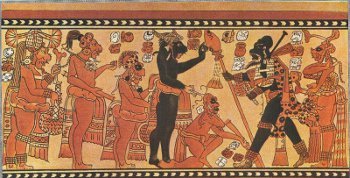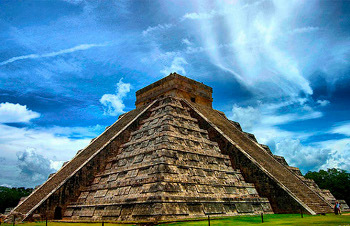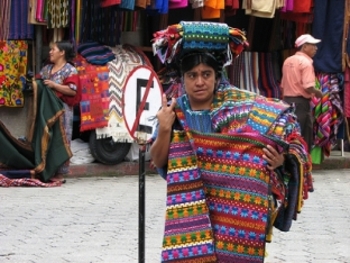The Ancient Mayans are renowned among historians and
archaeologists as being an incredibly advanced culture that excelled at
mathematics, astronomy and arts. With their star-based calendar
predicting the end of the world in 2012, many people are giving this
ancient culture a second look. Find out more about Mayan culture!

The Ancient Mayans created a written language similar to Egyptian Hieroglyphics
Chichen Itza in the Yucatan (Mexico) is a famous Mayan ruin
Mayan people today keep the tradition of weaving beautiful bright textiles, like this lady in Guatemala
Where in the World
The Mayans are one of the oldest societies documented, and come from
Belize, Guatemala, Honduras and El Salvador in Central America and Mexico.
You can still visit the ruins of the ancient people in these places
today, like the Chichen Itza temple in the Yucatan Peninsula of Mexico.
Although the Mayan civilization eventually blended into other
surrounding people, there are still many descendants of the ancient
Mayans who speak Mayan languages and preserve their own traditions and
arts, such as creating beautiful textiles (woven fabric).
The Ancient Maya
The Ancient Maya lived from 2000 B.C. to as late as the 16th
century A.D., even after competing cultures like the Aztecs and Spanish
Conquistadors took power in that part of the world. Mayan warriors
dressed in outfits with many feathers and tassels, and in modern Mayan
celebrations warrior costumes with bright feathers are made for men
dancing in traditional parades.
Science and Writing
The Ancient Maya were so advanced in some sciences that modern day
people often feel as if they have mystical powers and take their
predictions very seriously (like the prediction that the world may end
due to an astronomical power this year). They are possibly the first
culture to develop the telescope and map the stars and other phenomena
in the night sky using difficult mathematics. Using this information
they developed a nearly accurate calendar. Many of the events of their daily life were organized according to this calendar.
Science wasn’t their only feat though; they also developed a way of
writing similar to the ancient Egyptian hieroglyphics with more than
1,000 glyphs! Scribes had a special place in society and were revered
and respected by all.
Religion
The Ancient Maya believed in cycles and nature, and many of their rites
and religious events were held at specific times of the year. They
believed in three planes of existence: The Earth, The Heavens (above)
and the Underworld (below). These planes all had their own gods, not
all of whom were good, especially those dealing with death. Some art
suggests that they believed in human sacrifice, and it was performed by
priests for the good of the whole community.
The Ancient Maya also believed that the night sky was a window to the
gods and cosmos, and consulted three different calendars for religious
events: a solar, a lunar and one based on the planet Venus. In some
parts of Guatemala the lunar calendar is still used for religious traditions. Many rites originally centered around the life cycle of maize crops.
Ruins
The ruins of the Ancient Maya are fascinating for travelers the world
over, and attract large crowds. Many of their structures were rebuilt on
top of one another and show us exactly how they observed the stars and
performed religious rites. Many ruins show that they incorporated
information they knew about the sun and stars, such as the “snake”
shadow that appears on the stairs of the pyramid-like temple at Chichen
Itza in Mexico once a year. Caves were also popular, and often contain
Mayan hieroglyphics that are more intact since they were protected from
weather over the centuries.
follow me on twitter >>> GWS' say!
follow me on twitter >>> GWS' say!
click here : https://www.youtube.com/watch?v=MvC54vNK30s
----------ooOoo----------




Post a Comment